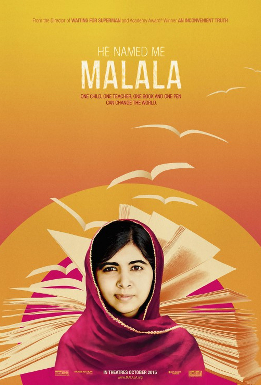Malala Yousafzai, an 18-year-old girl, is known around the world as a champion of peace and education for girls. Her fame has grown steadily, culminating in Malala winning the Nobel Peace Prize in 2014 along with fellow advocate Kailash Satyarthi. Of course it makes perfect sense that a documentary has been made about her.
In case you don't know Malala's story, she grew up in Pakistan, and when she was just a teenager, she decided to speak out publicly against the Taliban who were not allowing girls to go to school because they deemed it unnecessary. Malala knew speaking out was a huge risk but believed it was her duty. In retaliation, when Malala was 15, the Taliban boarded her school bus, asked which one was Malala, and shot her in the head. She miraculously survived, and the attempt on her life quickly made her a global figure.
He Named Me Malala is very much the story of Malala's life, from birth to now "“ a short but incredibly inspiring 18 years. We learn that she's very close with her father Ziauddin, a teacher and orator who also spoke up against the Taliban. We learn that her father is the one that instilled her love and fierce passion for education. We meet her mother, a quiet, conservative woman who misses Pakistan and its culture immensely. (The family now lives in England for Malala's protection.) We also meet her two younger brothers, who joke to the director that they don't get Malala's appeal because to them she's just their chiding older sister.
Seeing Malala at home with her family shows the other side of her that no one sees or thinks about. At the end of the day, Malala is just a teenager like any other teenager. She bickers with her brothers and fawns over talented (and handsome) cricket players. She gets bashful when asked if she'd ever ask a boy out. These quiet moments are often juxtaposed with Malala flying all over the world for speaking engagements. Her life is truly unique, and as she explains, it can be difficult. She has trouble making friends in the UK because of the cultural and lifestyle differences and she struggles with her schoolwork because she's gone so often.
Director David Guggenheim is certainly a fan of Malala. The documentary, like all documentaries, is selling its point of view that Malala is practically flawless in her courage and humility. Maybe to some it might seem like the film is one big fawn-fest. But to me, it was refreshing to see a film about someone survive so much tragedy at a young age and come out the other side stronger than ever. She doesn't hate the Taliban and the men that did this to her. As her father says when asked if he knows who shot Malala, "It's not a person who shot Malala; it is an ideology." Her father and she firmly believe that what the Taliban is doing is in opposition to Islamic teachings and that the Taliban has skewed the religion to gain power not to be truly devout.
It's an okay, mostly predictable documentary about an incredible young woman doing extraordinary things and making a real difference in lives all over the country with her charity the Malala Fund. In a time when the most lauded films are violent and dark, it's nice to watch a film about one of the lights in the darkness.

